A Blog to Promote Pro-Free Market Blogs. Capitalism is Good. Markets are Good. Freedom and Prosperity is good. Capitalism and the world thrives when honest people work and seek rewards for their work.
Saturday, June 29, 2013
90 Miles From Tyranny : Alec Baldwin Loses It In Homophobic Twitter Rant
90 Miles From Tyranny : Alec Baldwin Loses It In Homophobic Twitter Rant: Alec Baldwin calls gay reporter: "toxic little queen" and threatening, "I Am gonna f--k you up." Will Capital One Dro...
Friday, June 28, 2013
90 Miles From Tyranny : Five Drinking Stories That Put Yours To Shame
90 Miles From Tyranny : Five Drinking Stories That Put Yours To Shame: Turns out, the best drinking stories in history are actually, well, historical. So raise a glass to your forefathers and marvel at these t...
Monday, June 24, 2013
Tuesday, June 11, 2013
90 Miles From Tyranny : Russia's Vladimir Putin offers Asylum To Edward Sn...
90 Miles From Tyranny : Russia's Vladimir Putin offers Asylum To Edward Sn...: Russia has offered to consider an asylum request from the US whistleblower Edward Snowden, in the Kremlin's latest move to woo critics o...
'Game Of Thrones' Finale: 'Mhysa' Sets The Stage For Season 4

How do you follow up one of the most bombastically violent and depressing hours in the history of television? "Game of Thrones" had that challenge this week. After last episode's horrible Red Wedding sequence, where we lost three main characters and respect for a few more (screw you, Roose Bolton), there was really no place to go but up. Or rather, no place to go but on. Several characters did, indeed, move on (like Bran and Arya), and several more returned (Jon and Sam to Castle Black, Jaime to King's Landing). Nothing monumentous happened, but that's "Game of Thrones" for you - the final episodes are rarely more than churners devised to recover from the ninth episode's girth and set the stage for next season. Let's check in with where we leave each character at the end of this episode.
Arya: She may not have seen the Red Wedding first hand, but she did catch the gruesome after party (and saw her brother's mutilated body atop a horse, his head chopped off and replaced with his direwolf's). While riding silently through the woods with the Hound, they pass a group of Frey boys making camp and bragging about their part in the Red Wedding. Arya, in full-fledged vengeance mode, sneaks away from the Hound and infiltrates their camp, offering to pay to sit near their fire. But she just stabs one of them instead, over and over in the neck with a knife she swiped from the Hound, who swoops in to finish the rest of them off. The coin she offered to pay the men with before they met their fate was the one from old pal Jaqen H'ghar - Arya clutches it and repeats the words he taught her: "valar morghulis." All men must die.
The King's Landing Folks: Joffrey is so excited that Robb Stark is dead he almost explodes, but before he can rub it in Sansa's face, Grandpa Tywin sends him to bed without supper, reminding us yet again who's really in charge here. Tywin is the man who apparently orchestrated the Red Wedding, and who now has full command of the realm. If Tyrion gives Sansa a son, the north will truly be theirs. But now that Sansa knows what happened to her mother and brother, it doesn't seem likely she'll let Tyrion near her any time soon. Meanwhile, Cersei spews on about how much she loves her children (even Joffrey), and Varys pays Shae to leave so she doesn't compromise Tyrion's situation (she refuses). No word on what the Tyrells are up to.
Jon Snow: Ygritte catches up to him and shoots him with a bunch of arrows. After he tells her he loves her. Then he returns to Castle Black, where Sam and Gilly have just arrived.
Bran: Speaking of Sam and Gilly, they also had a run-in with Bran and the Reeds (and Hodor!) at the Blackfort, an abandoned castle on the Wall. Bran presses Sam about how to get through the Wall, and eventually Sam caves and tells him about the Black Gate - a secret passageway that guarantees easy entry. And now Bran is even closer to becoming a White Walker popsicle.
Theon: So Theon's captor? He's Roose Bolton's bastard son, Ramsay. Book readers probably saw that coming, but I'm sure show-only viewers were pretty bewildered by that reveal. (Or maybe not. What do I know?) Proof that macabre mutilation isn't just his daddy's game, Ramsay sends Theon's penis to his father, Balon, and sister, Yara, back in the Iron Islands. Balon barely reacts - now that his son is castrated, he can have no heirs, meaning his claim to the throne is worthless. But Yara is genuinely disturbed by the d*** in a box and rounds up a crew to go save her brother. I genuinely forgot that we haven't even seen Balon or Yara all season, so this felt a little abrupt and lackluster, but it's nice to know someone cares about Theon I guess.
The Dragonstone Folks: There's a lot of Davos in this episode, more Davos than I expected, which is fine because Davos is a pretty cool guy. He can read now, which comes in handy. He saves Gendry from Melisandre's wrath by setting him free. (Sail on, little Gendry!) And before Stannis can order his death for this, Davos unsheaths a letter he received from the Night's Watch warning Stannis about the growing threat of White Walkers. Melisandre lights up with this news and changes her mind about her decision to punish Davos by death. Instead, she convinces Stannis to recruit Davos to his mission - to go to the Wall and help the Night's Watch defeat the Walkers.

Danerys: The episode ends on a high note - with Dany freeing the Yunkai slaves and them embracing her with love and adoration. Good for Dany. I guess these people needed a Jesus figure or something, but I don't really see what Dany did in this situation that's worthy of a humble crowd surf and a bunch of peasants stroking her hair. (They should be shouting Jorah's name!) Still, it's pretty powerful to hear them cry out "mhysa," meaning "mother," while they cradle their new leader. While Westeros bloodies itself with betrayal, Dany is winning battles and conquering cities with genuine goodness. Obviously, ascending the throne in her homeland will be more difficult, but with thousands of freed people on her side, a ginormous Unsullied army and three dragons, I think her chances are pretty fair.
And with that, the season is over. I think it was a pretty great one overall, even though the finale felt a tad underwhelming. I'll be interested, as a book reader, to see where they take it from here (this finale was by and large the episode with the most changes from page to screen that has aired yet). But I'm excited too! See you next year!
Photo Credits: HBO
Tuesday, March 5, 2013
Hugo Chavez Is Dead
Caracas, Venezuela (CNN) -- Hugo Chavez, the polarizing president of Venezuela who cast himself as a "21st century socialist" and foe of the United States, died Tuesday, said Vice President Nicolas Maduro.
Chavez, who had battled cancer, was 58.
Chavez's democratic ascent to the presidency in 1999 ushered in a new era in Venezuelan politics and its international relations.
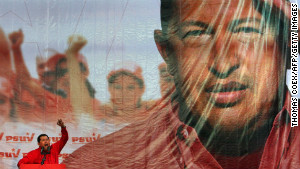 Hugo Chavez's legacy
Hugo Chavez's legacy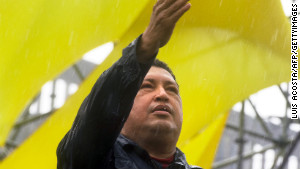 A look at the life of Hugo Chavez
A look at the life of Hugo Chavez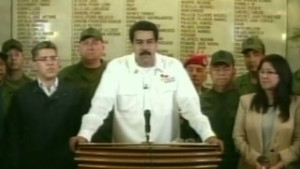 Vice president: Hugo Chavez is dead
Vice president: Hugo Chavez is dead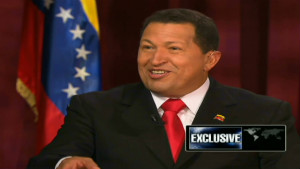 Hugo Chavez's 2009 interview with CNN
Hugo Chavez's 2009 interview with CNN
Once a foiled coup-plotter, the swashbuckling former paratrooper was known for lengthy speeches on everything from the evils of capitalism to the proper way to conserve water while showering. He was the first of a wave of leftist presidents to come to power in Latin America in the last dozen years.
As the most vocal U.S. adversary in the region, he influenced other leaders to take a similar stance.
But the last months of Chavez's life were marked by an uncharacteristic silence as his health worsened. Chavez underwent a fourth surgery on December 11 in Cuba, and was not publicly seen again. A handful of pictures released in February were the last images the public had of their president.
Chavez's ministers stubbornly maintained a hopeful message throughout the final weeks, even while admitting that the recently re-elected president was weakened while battling a respiratory infection.
President concentrated country's power
Chavez launched an ambitious plan to remake Venezuela, a major oil producer, into a socialist state in the so-called Bolivarian Revolution, which took its name from Chavez's idol, Simon Bolivar, who won independence for many South American countries in the early 1800s.
"After many readings, debates, discussions, travels around the world, etcetera, I am convinced -- and I believe this conviction will be for the rest of my life -- that the path to a new, better and possible world is not capitalism. The path is socialism," he said on his weekly television program in 2005.
Chavez redirected much of the country's vast oil wealth, which increased dramatically during his tenure, to massive social programs for the country's poor. He expanded the portfolio of the state-owned oil monopoly to include funding for social "missions" worth millions of dollars. That helped pay for programs that seek to eradicate illiteracy, provide affordable food staples and grant access to higher education, among other things.
But Chavez also leaves a legacy of repression against politicians and private media who opposed him.
He concentrated power in the executive branch, turning formerly independent institutions -- such as the judiciary, the electoral authorities and the military -- into partisan loyalists.
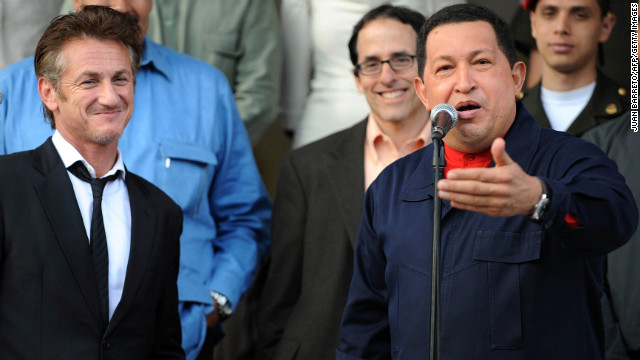 Photos: Celebrities and Hugo Chavez
Photos: Celebrities and Hugo Chavez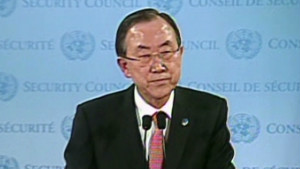 Ban Ki-moon reacts to Chavez's death
Ban Ki-moon reacts to Chavez's death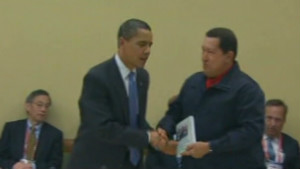 The relationship between Chavez and U.S.
The relationship between Chavez and U.S.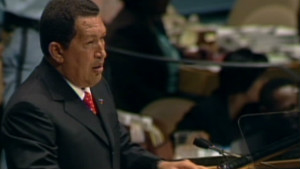 2006: Chavez calls Bush 'the devil'
2006: Chavez calls Bush 'the devil'
Through decrees and a judiciary tilted in the president's favor, many political opponents found themselves barred from running in elections against the ruling party. Even former allies, like Chavez's onetime defense minister, Gen. Raul Baduel, faced accusations that critics called trumped-up corruption charges.
Chavez's government similarly targeted opposition broadcasters, passing laws and decrees that forced at least one major broadcaster and dozens of smaller radio and television stations off the air.
Opponents also have criticized his social programs, calling them unsustainable over the long run and responsible for unintended consequences. Price controls, for instance, drove up inflation, while expropriations of farmland depressed production.
Vocal critic of American policy
In lengthy, freewheeling speeches, Chavez saved his most acerbic barbs for the "imperialist" United States and its "colonial" allies in the region.
He accused the United States of trying to orchestrate his overthrow, and referred to President George W. Bush as the devil in front of the United Nations General Assembly.
At home, business interests accused him of scaring off investment by abusing the power of expropriation. Venezuela struggled to grow its economy during this period, even as the nation was flush with money from oil, which was at about $17 a barrel when Chavez took office and rose to more than $100 a barrel.
In addition to domestic social programs, the Chavez government pumped money into his foreign policy interests. He invested millions of dollars in oil and cash in countries that were ideologically similar.
Chavez considered former Cuban leader Fidel Castro a mentor, and aligned his country with Iran and other nations opposed to the United States.
Cuba loses a benefactor in Chavez, whose provision of an oil lifeline at below-market prices could be at risk under a new government.
While Chavez admired Castro, he found most inspiration from Bolivar, even renaming the country the Bolivarian Republic of Venezuela.
An affable, if sometimes bombastic, man, Chavez had a disarming manner that even his critics could not deny.
Some called his style buffoonish, but he spoke like an ordinary Venezuelan -- not like a bureaucrat -- and voters reacted positively.
Other leftist leaders elected after him, like Bolivia's Evo Morales, Ecuador's Rafael Correa and Nicaragua's Daniel Ortega, followed Chavez's example to varying extents.
Chavez could also be secretive. He was slow to publicly admit that he had cancer, and never shared what type of cancer affected him. The government kept a tight seal on details of the president's treatment and declining health.
The death of the Venezuelan president leaves a sharply polarized country, with no clear successor for his party and an untested opposition. Chavez' passing means new elections will be held, although he had said previously he wanted Maduro to succeed him.
Chavez was born in the plains state of Barinas, in southwest Venezuela, on July 28, 1954, the third of the seven children of two educators.
As a child, he was an altar boy who went on to develop a great love of baseball. Recently, even as questions arose about his health, the media-savvy Chavez sought to reassure the public by playing catch with his foreign minister on state television.
Chavez became more authoritarian over the years
As a young man, he enrolled in the Military Academy of Venezuela, reaching the rank of sub-lieutenant in 1975. He joined the parachute corps of the army and rose through the ranks to become a lieutenant colonel.
His first political steps came when he founded the Revolutionary Bolivarian Movement, or MBR-200, in 1982. A decade later, on February 4, 1992, he led a failed military rebellion against then-President Carlos Andres Perez. He also made his first public appearance in front of the television cameras.
"Compatriots, sadly for now the objectives that we proposed were not achieved in the capital city," he said. "That is to say, we here in Caracas did not succeed in gaining power. You did it very well out there, but now is time to avoid more bloodshed. Now is time to reflect and new situations will come."
Chavez served two years in prison before then-President Rafael Caldera granted him amnesty.
Chavez went on to form a new political party, the Fifth Republic Movement, which carried him to a presidential election victory in 1998. His fiery campaign speeches blamed the traditional parties for corruption and poverty.
Chavez married twice and divorced twice. He had three children with his first wife, Nancy Colmenarez: Rosa Virginia, Maria Gabriela and Hugo Rafael.
Years later, he married Marisabel Rodriguez, with whom he had a fourth daughter, Rosa Ines. He divorced in 2003; Venezuela has had no first lady since then.
Upon taking office, Chavez made rewriting the constitution one of his first orders of business. A July 2000 referendum affirmed the new constitution, which the government printed as a little blue book that Chavez used regularly as a prop during speeches.
In the following years, the charismatic Chavez rattled off a string of electoral victories that made him seem almost invincible.
He won re-election in 2000, survived a recall election in 2004, and won another six-year term in 2006.
Chavez secured another re-election victory in October, describing his win as "a perfect battle, and totally democratic." He vowed to "be a better president every day."
A turning point for Chavez came in April 2002, when a coup briefly removed him from office.
But the interim government couldn't consolidate power, and within 48 hours, with the help of the military, Chavez returned to power.
While short-lived, the coup had a profound effect on Chavez, who took a more accelerated authoritarian and leftist turn afterward.
Human Rights Watch wrote in 2010 that the coup provided a pretext for policies that undercut human rights.
"Discrimination on political grounds has been a defining feature of the Chavez presidency," the report concluded.
"At times, the president himself has openly endorsed acts of discrimination. More generally, he has encouraged his subordinates to engage in discrimination by routinely denouncing his critics as anti-democratic conspirators and coup-mongers -- regardless of whether or not they had any connection to the 2002 coup," the report said.
He clamped down on broadcasters, other media
Consolidation of power in the presidency -- to the detriment of separation of powers -- became a theme in Chavez's policies.
Another challenge to Chavez's rule followed the coup. From December 2002 to February 2003, a crippling general strike pressured the president. The economy took a hit, but Chavez outlasted the strikers.
The following year, in 2004, the opposition gathered enough signatures to hold a recall referendum on Chavez, but again, the president survived.
Chavez's vitriol toward the United States also increased in the period after the brief coup because Washington had tacitly approved it.
In one of his most memorable insults, Chavez said of Bush in 2006 before the U.N. General Assembly:
"The devil came here yesterday. And it smells of sulfur still today."
In 2007, Chavez tasted defeat for the first time, in a referendum seeking approval for constitutional reforms that would have deepened his socialist policies. Nonetheless, thanks to a National Assembly friendly to him, Chavez achieved some of his goals, including indefinite re-election.
That same year, Chavez created a new political party, the United Socialist Party of Venezuela, which merged his party with several other leftist parties.
His detractors accused him of being authoritarian, populist and even dictatorial for having pushed through a constitutional reform that allowed indefinite re-election.
Increasingly, Chavez used legislation to clamp down on broadcasters and other media. His government relentlessly went after opposition broadcaster Globovision, accusing it of a number of violations, from failure to pay taxes to disregarding a media responsibility law.
The broadcaster is the last remaining TV network that carries an anti-Chavez line, since the president refused to renew the license of another opposition station, RCTV, allegedly over telecommunication regulation violations. The station had to go off public airwaves and transmit solely on cable.
Abroad, Chavez was also known for his colorful -- if sometimes strange -- statements.
Last year, after several Latin American leaders were diagnosed with cancer, himself included, he wondered if the United States was behind it.
"Would it be strange if (the United States) had developed a technology to induce cancer, and for no one to know it?" he asked.
During a water shortage that Venezuela suffered in 2009, he took to the airwaves to encourage Venezuelans to take showers that lasted only three minutes.
At a summit in 2007, his repeated attempts to interrupt resulted in King Juan Carlos of Spain saying to him, "Why don't you shut up?"
Chavez was a believer that the days of the "Washington consensus," a model of economic reforms favored by the United States for developing countries, were over.
Along with Cuba, Ecuador, Bolivia, Nicaragua and some Caribbean countries, Chavez formed the Bolivarian Alliance for the Peoples of Our America, or ALBA, a group intended to offer an alternative to U.S. influence in the region.
As president, Chavez made clear his ambitions of being a regional and international leader who left, in his own way, changes that awakened passions and feelings in favor and against -- everything except indifference.
Sunday, December 30, 2012
Hillary Clinton hospitalized after doctors discover blood clot
 CNN) -- Secretary of State Hillary Clinton was hospitalized Sunday after doctors discovered a blood clot during a follow-up exam related to a concussion she suffered this month, her spokesman said.
CNN) -- Secretary of State Hillary Clinton was hospitalized Sunday after doctors discovered a blood clot during a follow-up exam related to a concussion she suffered this month, her spokesman said.
She is expected to remain at New York Presbyterian Hospital for the next 48 hours so doctors can monitor her condition and treat her with anti-coagulants, said Philippe Reines, deputy assistant secretary of state.
"Her doctors will continue to assess her condition, including other issues associated with her concussion," Reines said. "They will determine if any further action is required."
Reines did not specify where the clot was discovered.
Clinton, 65, was suffering from a stomach virus earlier this month when she fainted due to dehydration, causing the concussion.
Clinton spent the holidays with her family last week after working from home.
She was scheduled to return to work at the State Department this week after being sidelined for the past three weeks. Her illness forced her to bow out of testifying December 20 before the House Foreign Affairs Committee on the deadly attack on the U.S. Consulate in Benghazi, Libya. Deputies Thomas Nides and Bill Burns appeared in her place.
The medical setback comes as Clinton is wrapping up her busy tenure as secretary of state, during which she has logged more than 400 travel days and nearly a million miles. She plans to step down from the post if and when Sen. John Kerry -- President Barack Obama's choice to replace her -- is confirmed by the Senate.
Subscribe to:
Posts (Atom)
